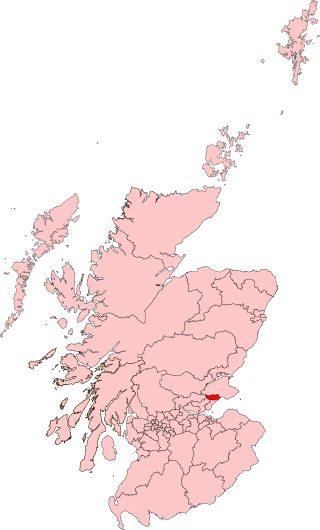
Fife is a council area, historic county, registration county and lieutenancy area of Scotland. It is situated between the Firth of Tay and the Firth of Forth, with inland boundaries with Perth and Kinross and Clackmannanshire. By custom it is widely held to have been one of the major Pictish kingdoms, known as Fib, and is still commonly known as the Kingdom of Fife within Scotland. A person from Fife is known as a Fifer. In older documents the county was very occasionally known by the anglicisation Fifeshire.

Inverkeithing is a coastal town, parish and historic royal burgh in Fife, Scotland, on the Firth of Forth, 9.5 miles northwest of Edinburgh and 4 miles south of Dunfermline.

North East Fife is a county constituency in Fife, Scotland, represented in the House of Commons of the UK Parliament by Wendy Chamberlain of the Liberal Democrats since the 2019 general election.

Cowdenbeath and Kirkcaldy is a county constituency representing the areas around the towns of Kirkcaldy and Cowdenbeath, in Fife, Scotland, in the House of Commons of the Parliament of the United Kingdom.

Dunfermline and West Fife is a county constituency represented in the House of Commons of the Parliament of the United Kingdom. It was created for the 2005 general election from all of the old Dunfermline West and parts of the old Dunfermline East constituencies. The current MP is Douglas Chapman of the Scottish National Party (SNP).

Kirkcaldy was a county constituency of the House of Commons of the Parliament of the United Kingdom in Fife, returning one Member of Parliament (MP). It existed from the February 1974 election until its abolition in 2005.

The Fife Circle Line is the local rail service north from Edinburgh. It links towns of south Fife and the coastal towns along the Firth of Forth before heading to Edinburgh. Operationally, the service is not strictly a circle route, but, rather, a point to point service that reverses at the Edinburgh end, and has a large bi-directional balloon loop at the Fife end.

Central Fife was a parliamentary constituency represented in the House of Commons of the Parliament of the United Kingdom from February 1974 until 2005, when it was largely replaced by the new Glenrothes constituency, with a small portion joining the expanded North East Fife.

Fife Constabulary was the territorial police force responsible for the Scottish council area of Fife.

Inverkeithing High School is a secondary school located in Inverkeithing, a historic town on Fife's southern coast 3½ miles from Dunfermline city centre, 9½ miles from Edinburgh city centre, and in between the towns of Dalgety Bay, Rosyth and North Queensferry.

The Fife Coastal Path is a Scottish long distance footpath that runs from Kincardine to Newburgh along the coastline of Fife. The path was created in 2002, originally running from North Queensferry to Tayport. It was extended in 2011 with a new section running from Kincardine to North Queensferry, then again in 2012 from Tayport to Newburgh. The path, which usually takes between one week and 10 days to walk in full, now runs for 187 kilometres (116 mi). The Fife Coastal Path is managed and maintained by Fife Coast and Countryside Trust, a registered environmental charity, and is designated as one of Scotland's Great Trails by NatureScot. About 500,000 people use the path every year, of whom about 35,000 walk the entire route.
The KY postcode area, also known as the Kirkcaldy postcode area, is a group of sixteen postcode districts in eastern Scotland, within thirteen post towns. These cover most of Fife, plus the far south of Perth and Kinross.

Dunfermline was a local government district in the Fife region of Scotland from 1975 to 1996, lying to the south-west of the regional capital Glenrothes.

Dunfermline is a constituency of the Scottish Parliament (Holyrood) covering part of the council area of Fife. It elects one Member of the Scottish Parliament (MSP) by the plurality method of election. It is one of nine constituencies in the Mid Scotland and Fife electoral region, which elects seven additional members, in addition to the nine constituency MSPs, to produce a form of proportional representation for the region as a whole.

Cowdenbeath is a constituency of the Scottish Parliament (Holyrood) covering part of the council area of Fife. It elects one Member of the Scottish Parliament (MSP) by the plurality method of election. It is one of nine constituencies in the Mid Scotland and Fife electoral region, which elects seven additional members, in addition to the nine constituency MSPs, to produce a form of proportional representation for the region as a whole.
The Fife derby is a football rivalry that is based in Fife, Scotland. Matches are contested between any two SPFL clubs from Dunfermline Athletic, Raith Rovers, East Fife and Cowdenbeath. As of 2021, a fifth Fife side, Kelty Hearts, entered the SPFL.
The Dunfermline and District Tramways operated a tramway service in Dunfermline between 1909 and 1937.

Elections to Fife Council took place on 5 May 2022 on the same day as the 31 other Scottish local government elections. As with other Scottish council elections, it was held using single transferable vote (STV) – a form of proportional representation – in which multiple candidates are elected in each ward and voters rank candidates in order of preference.















